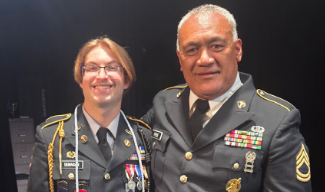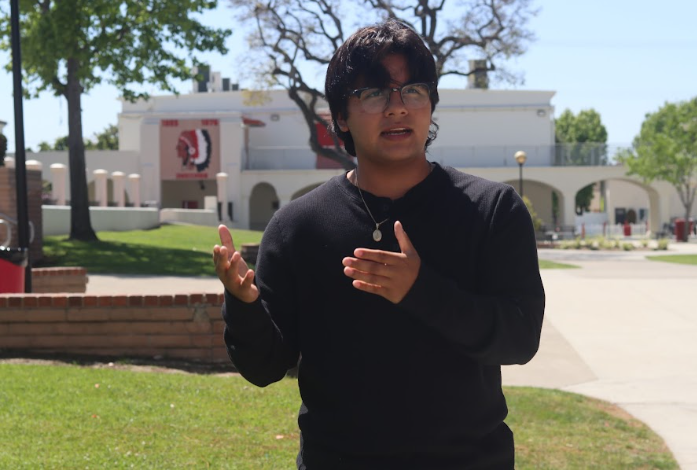Editor’s Note: This month the Tribe Tribune is featuring multiple stories about transgender rights. To ensure our sources’ safety and privacy, we have opted to not use our interviewees real names. I first interviewed “Nancy,” as well as her parents, in 2023. It was that same year that I had the opportunity to speak to “Jerry.” At the time, I wanted to write a story that authentically portrayed the two of them.
Certainly, the ever-shifting political climate did not help in my pursuit of writing a story. So I decided to wait and return to the story the following year. And, sure enough, things did change. Dramatically. After Donald Trump was elected, I revisited my interviews with Nancy and Jerry. I even interviewed them again and spoke to another student, whom I call Mike in this story.
The following is a culmination of a year’s worth of interviews and research. Along the way, I was able to learn more about the LGBTQIA+ community in a way I had not before. My hope is that after reading this story, you are inspired to seek out LGBTQIA+ voices and educate yourself further on the topic. I fear that until everyone is allowed to comfortably exist in their skin, we are all at risk.

(Artwork in watercolors by Lucia Churchill.)
When FUHS senior Nancy Cortez (not her real name) was 13, and nearing the end of eighth grade, she became consumed by feelings of distress and unease.
Born a male, Nancy started expressing disappointment with her body—believing it to be contrary to how she felt about herself internally.
“I was realizing, ‘I don’t wanna be like this or look like this’,” she said. “I had this fog looming over my head that something with who I was wasn’t right.”
As the COVID-19 pandemic forced schooling online, Nancy toyed with the idea of going by a different name. She found she was comfortable with feminine presentation and pronouns.
“I was experimenting with makeup and it felt like what I had been looking for,” she said. “The fog cleared.”
Nancy’s parents listened as their child tried to communicate her discomfort with her biological gender. After seeing a life coach, counselor, and therapist, it was a psychiatrist who was able to treat Nancy. According to the Mayo Clinic, gender dysphoria is characterized by the recurring grief arising when an individual’s gender identity differs from their biology.
Because Nancy is from an upper middle class family, and received support when she came out as transgender, she was able to consult a psychiatrist who diagnosed her with gender dysphoria. Per her psychiatrist’s recommendation, and with parental consent, she was able to take Estradiol (estrogen) and testosterone blockers at age 14. She even had her name legally changed in court.
The Tribe Tribune spoke with Nancy’s parents who said their support was the minimum they could have done as parents who love their child unconditionally.
“The way I see it, my job is just to protect and provide,” said Nancy’s father.
Nancy’s mother agrees: “As long as she is enjoying herself, being productive, and being a good human, that’s all I care about.”
Nancy views transitioning as allowing her to live authentically without the “fog.” Pre-transitioning, she recalls being at “a very low point.” She had been “super unmotivated” but was now eager and enthusiastic about school.
Nancy acknowledges that she is fortunate to have a supportive network of family and friends who comforted her while she transitioned. “It was never a concern among my friends, and I never feared anyone was going to be violent or bully me,” she said.
At 17, Nancy is at the cusp of adulthood. This also means she is the prime target for President Donald Trump’s executive order seeking to bar gender-affirming care for children under age 19. Because Nancy lives in California, she may still receive gender-affirming care without legal consequences due to Senate Bill 107 signed in 2022 by California Governor Gavin Newsom. Still, she is troubled by what she perceives as a spike in misconceptions relating to members of the transgender community.
“A lot of the rhetoric surrounding trans people in this administration is that they are out to harm you or indoctrinate you,” she said. “It makes it easier to seclude trans youth from classrooms and sports by claiming they might be indoctrinating others.”
In her sophomore year, Nancy decided to join school activities. She wanted to participate in a sport and belong to a team consisting of female peers. Nancy found that during her time on the team, she was making improvements while not outperforming any of her teammates.
“People think being trans, you have an insane biological advantage and these mystified powers,” she said. “Yet I was not the best player there, and I got better at the same rate that others did.”
She finds the accusations hurled at teachers equally baffling.
“It is hard to come up with a statement for somebody who believes that teachers are trying to socially and medically transition children,” she said. “It is so far from the truth because a teacher will never ask that a child suppress who they are.”
“That my existence has become a political issue that has to be debated on is upsetting.”
For senior Jerry Jones (not their real name), who is genderfluid but has identified as transgender in the past, gender-affirming care was never a possibility due to lack of parental support. Gender Fluidity is when an individual does not have a set gender identity. Jerry sees the ban on gender-affirming care as a move to strip transgender people of their civil rights.
“It is when you start limiting one’s ability to feel secure that it becomes mistreatment.”
Born a biological female, Jerry began questioning whether it was normal to feel like the opposite sex when he was in the sixth grade.
“I started thinking, ‘Maybe I could be a guy’,” he said. “I searched it up [on the internet] and was on a rampage and I thought to myself ‘This sounds like me.’”
However, without the approval of his guardian, Jerry cannot express himself truthfully. School, which he calls a “safe haven,” is where he does not have to abide by a fixed gender. At home, he goes by his dead name to avoid heated confrontations.
“At school I know I am supported but then at home it is like, ‘Don’t get caught’,” he said. “I’ve always had to tell my counselor and teachers to use my dead name when emailing my parent.”
He is grateful for California AB 1955, which was passed by California Governor Gavin Newsom in 2024. Otherwise known as the SAFETY Act, this bill maintains that district employees are not responsible for reporting a student’s sexual orientation, gender identity, or gender expression.
“If a child is not ready to come out or if they fear reprisal, then schools should not be outing the student,” Jerry said. “I believe that poses a significant threat to their mental health.”
Assistant Principal Leticia Gonzalez noted that district policies BP 0415.5 and AR 0415.5 are in compliance with the SAFETY Act and school employees must observe student privacy rights.
“At our school, we deeply value the rights of every student and are committed to ensuring they feel supported in all aspects of their education,” Gonzalez said. “If students ever have any questions or concerns regarding their rights, they can always come and speak to a counselor or administrator.”
Raised in a low-income household he describes as politically “conservative,” Jerry is familiar with criticisms of the transgender community that derive from religious beliefs.
“As a Christian myself, even religious arguments do not stand,” he said. “Even if you oppose somebody identifying as transgender, you must take into account that the Bible tells you to love thy neighbor as you love yourself.”
He has increasingly encountered transphobic commentary when scrolling on his phone.
“I’m subject to doom scrolling a lot,” he said. “I find a lot of political content, particularly right leaning, that refers to LGBTQ people as ‘creatures’ or ‘aliens’.”
Jerry says it helps that he lives in California, where he feels respected by state law.
“My only fear is that I am going to get outed and disowned,” he said. “As a low-income student, I do not have access to resources that would be available to me if I was middle class.”
Lately, whenever Jerry has been feeling anxious or dispirited, he goes to his friends. Many of them identify with the LGBTQIA+ community themselves.
One of Jerry’s friends, a junior named Mike (not his real name), has been on his own journey of transitioning from female to male. When news of Trump’s executive order broke, Mike questioned whether it would impact his access to testosterone which he had only just begun taking in 2024.
“I am very afraid,” Mike said. “I’m glad I live in California, but I am still scared.”
Mike is critical of Trump’s remarks that misconstrue the process of transitioning. He had to wait several months before he could even discuss hormone replacement therapy with a healthcare provider.
“I started trying to [receive testosterone] since freshman year,” Mike said. “I had to be diagnosed with gender dysphoria first by a professional, and then my mom had to find a gender clinic that worked with her insurance. This was all to just schedule my first appointment.”
When the future seems too scary, he finds comfort in family, school, and friends.
“Fullerton’s a really supportive school,” Mike said. “I have a lot of trans friends and friends who are there for me.”
Nancy, however, no longer sees a viable future in the United States and plans to leave after completing college.
“When you subject people to this they are going to flee,” she said. “You cannot stop trans people from existing, only silence them.”
Jerry is choosing to remain optimistic about his future and wants to be a psychologist to help those who find themselves in a similar situation. Jerry says he benefits from talking to FUHS mental health specialist David Saldaña.
“I want to be a psychologist or work in a school like Mr. Saldaña does,” Jerry said. “I see him help others every day and he’s reignited my passion to help others.”
 Special Feature
Special Feature
Related Stories:
Speaking From the Heart: Salazar confronts transphobia in award-winning speech













